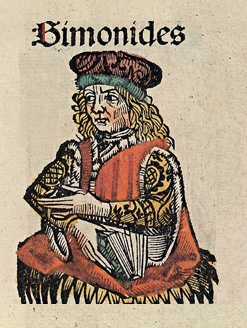Simónidés z Keu citáty a výroky
Simónidés z Keu: Citáty v angličtine
“Painting is silent poetry, and poetry painting that speaks.”
Quoted by Plutarch, De gloria Atheniensium 3.346f http://www.perseus.tufts.edu/hopper/text?doc=Perseus%3Atext%3A2008.01.0234%3Astephpage%3D346f.
Variant translations:
Painting is silent poetry, and poetry is painting with the gift of speech.
Painting is silent poetry, poetry is eloquent painting.
See also: Ut pictura poesis
Go, tell the Spartans, stranger passing by
That here, obedient to their laws, we lie.
Epitaph on the Cenotaph of Thermopylae, recorded by Herodotus.
There is a long unsolved dispute around the interpretation of the word rhemasi, such as laws, words or orders.
Variant translations:
Go, tell the Spartans, thou who passest by,
That here obedient to their laws we lie.
Stranger, go tell the men of Lacedaemon
That we, who lie here, did as we were ordered.
Stranger, bring the message to the Spartans that here
We remain, obedient to their orders.
Oh foreigner, tell the Lacedaemonians
That here we lie, obeying their words.
Go, tell the Spartans, passerby,
that here by Spartan law we lie.
Go, tell the Spartans
stranger passing by,
that here, obedient to Spartan law,
we dead of Sparta lie
“Not even the gods fight against necessity.”
Quoted by Plato in the dialogue Protagoras, 345d http://www.perseus.tufts.edu/hopper/text?doc=Perseus%3Atext%3A1999.01.0177%3Atext%3DProt.%3Asection%3D345d (Simonides Fr. 37.1.27 ff.).
Variant translations:
The gods do not fight against necessity.
Not even the gods war against necessity.
I praise and love all men who do no sin willingly; but with necessity even the gods do not contend.
Epitaph of the Spartan Diviner, Megistias, at Thermopylae
“We did not flinch but gave our lives to save Greece when her fate hung on a razor's edge.”
From the Cenotaph at the Isthmos
